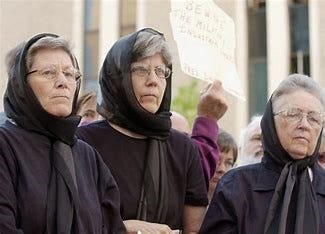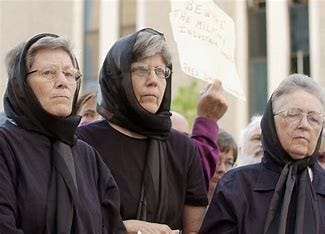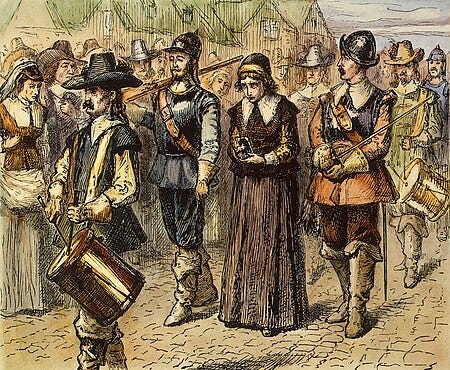In 2003, three nuns in their fifties and sixties, broke into a missile silo in Colorado, hammered the silo’s 110-ton concrete lid, and painted it with crosses in their own blood.
Why? “Our motivation was symbolic diarmament,” said one. “Our intention was to stop these weapons.”
Since three nuns were not likely to stop the weapons, they probably had a deeper motivation. Using their own blood goes beyond mere protest. Like flagellants and ascetics of the past, drawing blood is a symbol of suffering. Anne Catherine Emmerich (1774-1824) for example, asked God to help her suffer as Jesus did on the cross, in order to purge herself of all sin. For the rest of her life, she inflicted incredible pain on herself. She had crosses imprinted on her chest and had blood dripping from her head where the crown of thorns would be.
“I believe I had to go there to stop a crime against humanity,” said one of the Colorado nuns. The existence of such weapons, she said, “is a crime of genocide.” Their real motivation said Ardeth Platte is to serve God. “Whatever God asks us, whatever we have to sacrifice, we will do it, and we will do it with joy.”
A local pundit wrote, “they are sort of like angels.” The Denver Post suggested, “To supporters, they are courageous, dedicated, faithful, wise – even martyrs.”
I realize this sounds unkind, but much of the above is nonsense.
Crime against humanity? We could say that all weapons are crimes against humanity, starting with clubs. Mutually Assured Destruction during the Cold War, prevented the weapons from being used. The world has always been a dangerous place. Governments that don’t “provide for the common defense,” will be overrun by bad guys.
Doing what God asks? People often justify their actions by claiming to do God’s bidding. It used to be, “the devil made me do it.” The actual culprit here is not God, it’s their own inner demons and existential fears.
Genocide? Like the word “nazi,” it is so overused that it ceases to have any meaning. What kind of genocide results in no deaths whatsoever?
Wise? I’d suggest foolish.
We can take them at their word that they just wanted to serve God. But I would suggest that at least part of their motivation – which is so often the case with we humans – was to serve themselves. They wanted to be martyrs; they craved a sense of purpose. History is surfeited with people who exerted extraordinary effort to achieve martyrdom through suffering.
According to historian, Daniel J. Boorstin, the early Quakers “engaged in a relentless quest for martyrdom.” “One after another of them,” wrote Boorstin, “seemed to lust after hardships, trudging thousands of wilderness mile, risking Indians and wild animals, to find the crown of martyrdom. Never before perhaps have people gone to such trouble or traveled so far for the joys of suffering for their Lord.”
When Quaker Mary Dyer, was sentenced to death for preaching in the Puritan colony of Rhode Island in 1660, she announced, “It is an hour of the greatest Joy I can enjoy in this World. No Eye can see, No ear can hear, No Tongue can speak, No Heart can understand the sweet incomings and refreshings of the Spirit of the Lord which I now enjoy.”
To Mary Dyer, the death sentence was spiritual ecstasy, common among martyrs past and present. Prior to the sentencing, Ardreth Platte said, “Whatever sentence I receive today will be joyfully accepted as an offering for peace. With God’s help it will not alter my spirits.” When the Colorado nuns were sentenced to up to three years in prison, they reacted with defiance, energy and happiness.
Another, Carol Gilbert, announced with bravado that “what the government fails to recognize is that long prison sentences will only energize the movement.” In other words, the more they suffer, the greater will be their martyrdom, the more influence they will have, the more admiration they will receive. Gilbert’s next comment was revealing. “I don’t fear going to prison. I don’t fear loss of freedom to move about. I don’t even fear death. The fear that fills me is not having lived hard enough, deep enough and sweet enough with whatever gifts God has given me.”
The fear that fills her is that she has not struggled and suffered enough to feel worthy of life. The suffering she endured in this life assures her place in the next one.
Cynical? Undoubtedly. Accurate? Probably. Were they sincere? Unquestioningly. Misguided? Absolutely.
Author’s note: Interestingly, the lives sisters generally lead, provide a surprising bonus, to be discussed in the next post in four days.







Before Constantine the Roman population thirsted for the blood of Christians and wrote so many denunciations against them that the Emperor Trajan forbade the court to take these denunciations into consideration; by his edict a Christian was to be executed only when he himself had denounced himself.
The ethics of the Socratics, Stoics, and Epicureans, were no longer relevant to those people who believed in the resurrection from the dead. The afterlife was seen as immutable as the real, and hence the concern for saving one's soul after death arose. This seemed more important than the preservation of the present brief life, because the afterlife was deemed eternal, and it made practical sense to ensure one's well-being in it.
Eternal salvation from the sorrows of the world was best provided by martyrdom. This is why, already after the Edict of Milan, some African Donatists, called "circumcellions" (i.e., "those wandering around"), formed gangs of fanatics who, when they caught a solitary traveler, demanded that HE kill THEM for the glory of Christ. The man begged to be spared this obligation, because he was afraid to slaughter even a chicken, but they gave him a choice: kill us or be killed yourself. After all, they were allowed to do anything, because martyrdom atoned for all sins. And the poor man had to take the club from them and beat them one by one on their heads. And they died in the expectation of eternal bliss.
People subjected themselves to torture, deprivation, fasting, and celibacy for the sake of eternal bliss. Those of them, who sat in the desert - hermits, did not cause anyone trouble, but wandering monks, of which there were many, were a constant concern to the provincial rulers and even emperors, because they feared nothing and no one, depended on no one, and moved extremely actively on a whim, not always without harm to neighbors.
THAT'S CHRISTIANITY at the root.
Now, I think we have to realize, people engage in theatrics for the effect. The effect is an awareness of the lunacy of having a war to bring peace. To say that these nuns wanted unilateral disarmament (even if that is what they spoke), is our presumption. The wanted a process of conciliation. We presently have the opposite, a process of ramping up hostility. People gain unimaginable wealth through that distorted process.
World peace was brought by Stalin's program, that finally blew off the hydrogen bomb in 1954. Otherwise we would have been in nuclear winter for decades.
How the hell did three nuns enter a restricted military range with the highest security, and hammer on a silo lid? Really these nuns are heroes, because they exposed the inept security that our fake military exercises. The colonel that runs that base and all of his subordinates should have been court-marshaled and held in treason for dereliction of duty. It is them that should be in the brig, for 3 years or longer.
From your last piece (three other nuns), I commented that they must have a first-person relationship with God. I believe that is unmistakable for them, and not confused with personal demons nor existential fears. (Even if you and I have no idea of what that means. It may not enter our vocabulary.)
I don't see martyrdom as a current motivation. Yes, a few years in jail to hit the news is a calculation. Perhaps long jail terms will make public awareness more acute. Nothing to do with martyrdom.
People can fear not acting on their principles. Do you know anyone like that? I don't meet anyone who can even articulate principles.
Is that a "God-thing" or is that just who they are?
.